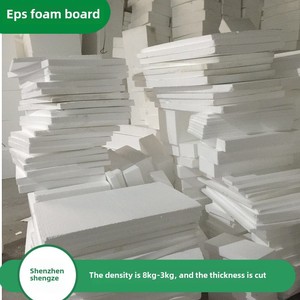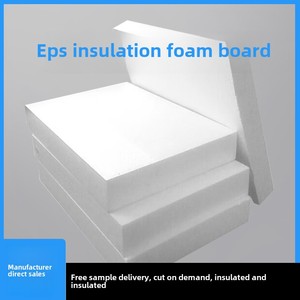
All categories
Featured selections
Trade Assurance
Buyer Central
Help Center
Get the app
Become a supplier

(171 products available)














































A polystyrene concrete slab is a type of slab that integrates expanded polystyrene (EPS) foam with concrete. The foam provides insulation and reduces the weight of the slab. These are the types of polystyrene concrete slabs:
This is a common type of foundation in residential construction. Workers can build it quickly and easily because it requires no excavation. They pour concrete directly into molds on the ground. The result is a flat, even surface that serves as the foundation for the home. The slab-on-grade foundation is also a cost-effective choice. It does not require as much labor or materials as other types of foundations. This can help reduce the overall cost of building a home. The slab-on-grade foundation is a popular choice for residential construction because it is cost-effective and easy to build. Additionally, using EPS insulation under slab can enhance thermal performance.
Ribbed slabs are popular for projects where the ceiling needs to look attractive. The ribs help hide ductwork, plumbing, and electrical wiring. They create interesting patterns on the ceiling. Because the ribs make the slab lighter, builders can use less concrete to create a floor or roof that can support weight. This makes ribbed slabs a cost-effective choice. Ribbed slabs also resist heat and sound. The air-filled pockets inside the ribs act as insulation. This keeps buildings cool in hot weather and warm in cold weather. The air pockets also block noise from outside or other rooms. This helps create a more comfortable living or working environment. Furthermore, incorporating styrofoam under concrete can improve energy efficiency.
Prefabricated slabs are made off-site in a factory. This means the weather will not affect construction. The slabs are then transported to the construction site and pieced together. This makes construction faster and more cost-effective. The designs and sizes of prefabricated slabs can be customized to fit the needs of a project. This means they can be used for residential, commercial, or industrial buildings. Prefabricated slabs are a strong and durable choice. They are made with reinforced concrete and have a layer of polystyrene foam for insulation. The concrete can be textured to look like other materials. It can be made to look like stone, brick, or tile. Additionally, using styrofoam under concrete slab enhances insulation properties.
One of the primary functions of polystyrene concrete is insulation. Polystyrene is a material that has a low thermal conductivity. This means that it does not allow heat to pass through it easily. Polystyrene concrete slabs, therefore, prevent the loss of heat in buildings or the gain of heat from outside. This makes buildings more energy efficient because less energy is needed to heat or cool them. Utilizing styrofoam under slab can further enhance thermal performance.
Polystyrene has properties that allow it to absorb sound well. When used in concrete slabs, it helps to reduce the amount of sound that passes through the floor. This is useful in buildings because it helps to make sure that what happens in one room is not easily heard in another. It also helps to reduce the noise from outside so that people in the building are not disturbed.
Polystyrene is a lightweight material. When it is added to the concrete, it reduces the overall weight of the slab. This makes polystyrene concrete slabs a good choice for upper floors or roofs because they will not add a lot of extra weight to the building.
Polystyrene is a closed-cell material. This means that it does not allow water to pass through it. Polystyrene concrete slabs are, therefore, resistant to moisture and water. This helps to prevent issues like mold growth or rotting. It also helps to stop water from leaking into the building through the floor.
Polystyrene concrete slabs are durable and long-lasting. The combination of concrete and polystyrene makes the slabs resistant to damage from things like fire, insects, and weather. This means that they need little maintenance and will last a long time.
Polystyrene concrete slabs are easy to install because they are lightweight. This works especially well for construction because it reduces the amount of time and labor needed to install the slabs. This helps to save money and time during construction.
Polystyrene concrete slabs are widely used in the construction industry for various applications due to their unique properties and benefits. Here are some common usage scenarios:
Polystyrene concrete slabs are used to build foundations for residential, commercial, and industrial buildings. Because they are lightweight, they reduce the load on the soil. This helps to prevent soil settlement and costly foundation repairs. Additionally, their insulation properties help to keep buildings warm in cold weather and cool in hot weather. The use of styrofoam under concrete can significantly enhance the performance of these foundations.
These concrete slabs are used in the construction of roads and highways. Their lightweight nature simplifies construction and reduces the cost by allowing the use of lighter construction equipment. They also reduce soil settlement and erosion along road edges.
Polystyrene concrete slabs are a popular choice for airport and runway construction. Due to their lightweight nature, they provide stable and smooth surfaces for aircraft takeoff and landing. Moreover, polystyrene concrete slabs are easily repairable and adjustable when there is a need to expand or repair the runway.
They are also used to create industrial flooring. Their design enables the installation of utilities like wiring and plumbing without breaking the floor. Additionally, their insulation properties help to maintain a stable internal temperature, which is essential for some industrial processes.
Polystyrene concrete slabs are widely used in constructing bridge decks. Their lightweight nature reduces the load on the supporting structure. This increases the life span of the bridge and minimizes the risk of structural failure. Additionally, they are used in developing bridges in seismic regions as they offer flexibility to absorb seismic movements.
These slabs can be stacked together to create effective sound barriers along highways and railways. This reduces noise pollution in surrounding areas. Their lightweight nature simplifies and quickens the construction of sound barriers.
They are used to create retaining walls and terraces in landscaping projects. Their lightweight nature allows for easy installation without the need for heavy machinery. Additionally, they provide stability and prevent soil erosion in sloping areas.
These slabs are also used in the construction of swimming pool decks and patios. Their lightweight nature allows for easy installation around pool areas. Additionally, they provide a stable and non-slip surface that is safe for pedestrians.
Choosing the right polystyrene concrete slab is not as easy as many think. However, with the right information, anyone can make the right decisions. Here are some factors to consider when choosing polystyrene concrete slab.
One of the biggest things to pay attention to is where the concrete slab will be used. For instance, if it is for residential purposes, standard concrete will work. However, if it is for industrial purposes, then heavier and stronger concrete will be needed. Therefore, understanding where the slab will be used is one of the most important things to consider when choosing concrete slabs.
It goes without saying that the strength of the concrete slab is a very important factor when choosing a slab. There are many things that can determine the strength of the slab. For instance, the quality of the materials used to make the slab, the curing process, and the additives added to the slab are some of the factors that can determine the strength of the slab. Therefore, it is important to choose a slab that has the required strength depending on the application.
Reinforcement is important when it comes to controlling the slab's durability. There are many ways to reinforce a slab, and one of the most common methods is using steel bars. Steel bars are usually placed within the concrete before the concrete is poured, and they play a big role in controlling the slab's durability. The way the steel bars are arranged also contributes to the slab's durability. There are companies that use polystyrene reinforcement when making polystyrene concrete slabs. This method is quite effective, and the good thing is that it reduces the slab's weight. Therefore, it is important to ensure that the reinforcement method used to make the slab is good enough to prevent any damage from occurring.
It is good to choose a slab thickness that is compatible with the application. In most cases, slabs for industrial applications are usually thicker than those for residential applications. However, choosing a slab that is not thick enough can lead to many problems. For instance, the slab can crack, and it can also collapse. Therefore, this is an important factor to consider when choosing a concrete slab.
Q: What are the environmental benefits of polystyrene concrete slabs?
A: Polystyrene is a recyclable material, which means waste can be reduced during construction. It also has good thermal insulation properties, which can help reduce energy consumption in buildings by keeping them warmer in winter and cooler in summer. This makes polystyrene concrete slabs a sustainable building material.
Q: How do polystyrene concrete slabs compare to traditional concrete slabs?
A: Polystyrene concrete slabs are lighter and easier to handle than traditional concrete slabs, which can speed up the construction process. They also provide better insulation, reducing the need for additional insulation materials. However, traditional concrete slabs may be more suitable for heavy-duty or high-traffic areas.
Q: What factors should be considered when installing polystyrene concrete slabs?
A: Proper installation is key to realizing the benefits of polystyrene concrete slabs. This involves ensuring the slabs are properly aligned and supported to prevent settling or shifting over time. Adequate clearance from utilities and proper drainage should also be considered during installation to prevent water damage.
Q: Are there any limitations to using polystyrene concrete slabs?
A: While polystyrene concrete slabs offer many benefits, they may not be suitable for all applications. For example, they may not provide the necessary load-bearing capacity for heavy-duty industrial or commercial structures. Consulting with a structural engineer can help determine the suitability of polystyrene concrete slabs for a specific project.